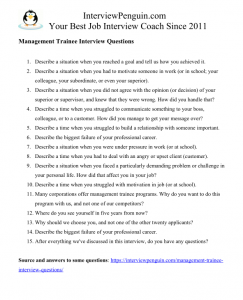When an average Joe wants to learn leadership, time management, or sales, they will pay money for books, courses and seminars. Or they attend a University (and pay costly tuition each semester).
As a Management Trainee you will learn these skills for free. And free education is always a great investment. What’s more, you will do it in a corporate environment, which is ten times better than learning from books, or from University professors, who’ve never run a real business, or managed anyone, or risked their own capital. Best of all–you will get paid for your training. Is this really possible?
Well, it is possible in current economic climate. Companies fight for new talent, and nearly every company struggles with workforce. Offering a Management Trainee program to fresh graduates (or even to undergraduates) is an excellent way of securing new employees, and hopefully also their loyalty in the future. This is true for other field than management as well, such as healthcare, finance, or IT. Let’s have a look at what will happen in your interview.
Table of Contents
Intelligence and attitude matters the most
In big corporations, they do not want to hire people who already know everything. Sometimes they actually prefer to hire people who know “nothing”, who haven’t done any managerial work before.
They prefer to train their new hires, to shape them to their image. Fair enough, their training programs are good. If you want to be employed in the corporate mechanism for your entire life (with all good and bad things that belong to this choice), you should let them to shape you.
Behavioral and situational questions, IQ test
Since they do not care about your knowledge, they will ask you mostly behavioral questions. These questions help them understand how you would react to various situations that happen in a workplace, such as conflict with a colleague, facing pressure, meeting deadlines, experiencing failure, losing motivation, struggling with computer software, etc.
Your answers help them to understand your attitude, whether you would fit their working culture, and whether it would be easy to train you, so you can play your little role on their big operation.
In many cases they will use also an IQ test, but I won’t write about this part of an interview, since you can not prepare for an IQ test in advance. The same applies to a personality test. Either you have the right personality (and sufficient intelligence), or you don’t. No shortcuts or tricks here, sorry.
Let’s have a look at the questions right now–a part of an interview you can prepare for.
Describe a situation when you reached a goal and tell us how you achieved it.
They try to understand a few things with this question: Whether you set goals (which is very important for any job in big corporation), how important the achievement is for you, whether you can give credit to other people who helped you on your way, etc.
You can talk about goals you set in your professional life (something you tried to achieve in school, or in your last job or volunteering experience), but also about goals from your personal life.
For example, a chain smoker who managed to quit smoking demonstrates strong determination and will with achieving this feat. And that comes handy for many jobs.
Speak with enthusiasm. They should feel that you enjoy setting goals and achieving them later…
* A must read if you experience anxiety: How to overcome interview nerves.
Describe a situation when you had to motivate someone in work (or in school; your colleague, your subordinate, or even your superior).
Once again, they test your attitude. Do you care about your colleagues? Are you attentive to their needs and problems? Are you willing to step out of your comfort zone, and help someone?
In your training, you will learn how to motivate your colleagues (at least in the particular working environment of the corporation), but for the interviewers it is important to know whether you want to do that, whether you care for the others (or only for your own gain and well-being)…
You can talk about words of encouragement, team-building, a situation when you helped someone to see the reason why they should go on, etc.
Describe a situation when you did not agree with the opinion (or decision) of your superior or supervisor, and knew that they were wrong. How did you handle that?
The most important thing is to stay calm when answering this question. Disagreement is inevitable, and you should be ready to express your opinion clearly.
If you made a mistake, admit it. Once again, the hiring managers try to find out more about your attitude. Are you ready to give, and to receive criticism? Do you think critically, or just blindly listen to each order from your superior? Are you able to approach conflicts with a cool head?
Ensure them that you do not hesitate to give constructive feedback to your superiors, trying to help the company to prosper.
Special Tip: You can download the full list of questions in a one page long PDF, and practice your interview answers anytime later:

Describe a time when you struggled to communicate something to your boss, colleague, or to a customer. How did you manage to get your message over?
As a manager you will meet with all kinds of people. Some will be smarter than you, and some will know nothing at all. Some will understand each word you say, and some won’t understand anything, or, which is even worse, they won’t want to understand.
Anyway, show the hiring managers that you do not mind stepping out of your comfort zone, explaining your message in a most simple way, in a language of common people, using demonstration, pictures, and other means of getting your message over.
You can’t manage anyone unless they understand what you want from them. Show the interviewers that you understand this rule, and will work accordingly.
Describe a time when you struggled to build a relationship with someone important.
Interviewers try to see if you can build a good connection with your boss, your colleagues, the clients, or the stakeholders in general. They also try to understand whether you take the initiative and try to strengthen the relationships, or wait for the other person to make the first move.
You should speak about the situation with a good outcome ,and you should stress that you tried to build the relationship, that you took the initiative.
If this is your first job application, speak about building relationship with your teacher, thesis editor, or with anyone else who played some important role in your life.
Other questions you may face in your management trainee interview
- Describe the biggest failure of your professional career.
- Talk about a situation when you were under pressure in work (or at school).
- Describe a time when you had to deal with an angry or upset client (customer).
- Narrate a situation when you faced a particularly demanding problem or challenge in your personal life. How did that affect you in your job?
- Describe a time when you struggled with motivation in job (or at school).
- Many corporations offer management trainee programs. Why do you want to do this program with us, and not one of our competitors?
- Where do you see yourself in five years from now?
- Why should we choose you, and not one of the other twenty applicants?
- Describe the biggest failure of your professional career.
- Tell us about an obstacle you overcame.
- Tell us about a time when you had to deliver a difficult feedback to someone.
- Describe the best project you’ve ever worked on.
- …..
Conclusion, final tips, premium answers to all questions
Management Trainee is an excellent entry level job, especially if you want to spend your professional career working for big corporations, managing people and processes. The interview is difficult, however, partly because of the questions, but also for the competition you will face.
If you apply for a management trainee job with Amazon or AT&T, or other famous corporation, you can easily face a competition of twenty or even fifty applicants, and they will choose just the best three or four from the entire group. Will it be you?
Prepare for the questions, and learn as much as you can about the corporation. Try to make the most out of this opportunity. And if you experience anxiety, or aren’t sure how to answer the questions, have a look at our Interview Success Package. Up to 10 premium answers to every tough question you may face in your management trainee interview will help you outclass your competitors, and secure the coveted trainee contract…
Thank you for checking it out, and I wish you good luck in your interview!
Matthew
May also interest you:
- Entry level financial analyst interview questions.
- Management style interview questions.
- Are you a leader, or a manager?


